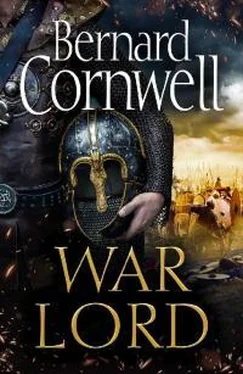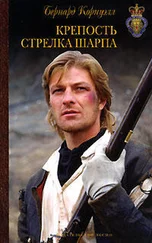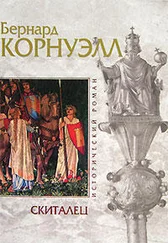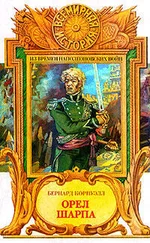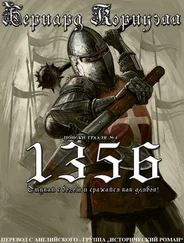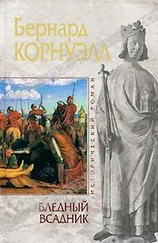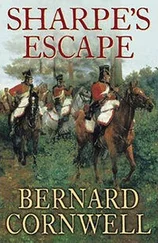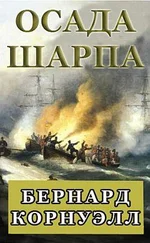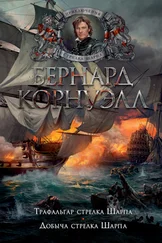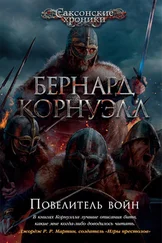He was right, of course, at least about what Æthelstan wanted. ‘Æthelstan,’ I said, ‘keeps his promises.’ Yet in truth Æthelstan had betrayed me, he had broken his promise, yet here I was; doing just what he wanted.
‘He promised,’ Guthfrith said, ‘not to invade Northumbria while you lived, yet he’s here!’
‘He came to talk with you, nothing else.’
‘Maybe I should kill you. Maybe the little turd would like that.’
‘You can try,’ I said. My son’s horse stirred behind me, a hoof clicking against one of the road’s broken stones.
Guthfrith edged his horse towards me and swept the sword over and down so the blade was in front of me. ‘You have never sworn me an oath of loyalty, Lord Uhtred,’ he said, ‘yet I am your king.’
‘True,’ I said.
‘Then on your knees, Jarl Uhtred,’ he said, sneering at the word ‘jarl’, ‘and give me your sworn oath.’
‘And if I don’t?’
‘Then you will feed Boar Tusk.’ I assumed Boar Tusk was the name of his sword that was now close to my face. I could see the nicks in the sharpened edges, could feel the heat of the steel on my cheek, and was dazzled by the sun reflecting brilliant from the vague whorls in the hammered steel. ‘Down!’ Guthfrith commanded, jerking the blade.
I looked up into his small dark and suspicious eyes. ‘I shall demand the archbishop’s life in exchange for the oath,’ I said, ‘and the lives of the other hostages.’
‘You can demand nothing,’ he snarled, ‘nothing!’ He prodded the sword hard, grating its tip on my mail until it lodged in one of the links, forcing me back a half pace. ‘You will be my sworn man,’ he said, ‘and you will get only what I choose to give. Now down on your knees!’ He prodded again, harder.
There was a gasp of astonishment from my son as I knelt meekly and lowered my head. Guthfrith chuckled and held his sword’s tip close to my face. ‘Kiss the blade,’ he said, ‘and say the words.’
‘Lord King,’ I said humbly, and paused. My left hand found a stone about the size of a fist.
‘Louder!’ Guthfrith snarled.
‘Lord King,’ I said again, ‘I swear by Odin …’ and with that I brought the stone up and smashed it into the stallion’s mouth. I hit the snaffle, crushing the silver decoration, but the blow must have hurt because the horse reared and whinnied. Guthfrith’s sword vanished from my sight. ‘Now!’ I bellowed, though neither my son nor Berg needed the encouragement. Guthfrith was struggling to stay in the saddle of his rearing horse. I stood, cursing the pain in my knees, and seized his sword arm. My son was to my left, keeping that man distracted by thrusting a sword at his belly. I hauled on Guthfrith, pulled again, was jerked to my right by the stallion, but Guthfrith fell at last, crashing down onto the road and I wrenched his sword free, dropped on his belly with my knees, and held Boar Tusk’s blade at his straggling beard. ‘You’ll only get one oath from me, you miserable slime-toad,’ I snarled, ‘and that’s a promise to kill you.’
He lurched up and I forced the sword down hard, which stilled him.
And behind me Finan was charging. My men’s spears were lowered, the blades glittering in the harsh sun. Guthfrith’s men had been much slower to react, but now they were coming too.
And once again I was not certain I was fighting for the right side.
Two
Was it the wrong side?
I had no liking for Guthfrith. He was a drunken bully, a fool, and in the short time he had been King of Northumbria he had only succeeded in shrinking its borders. Now, on the hard road, he grunted something and I pressed the sword to silence him.
My son had pierced his enemy through the belly. He had ripped the sword free, turned his horse, then swung the blade back onto the man’s neck. It was brutal, it was quick, and it was well done. The man swayed, his horse swerved, and he fell with a thump into the weeds beside the road. His body jerked as the blood stained the dust.
Guthfrith lurched again and I rammed the sword-blade harder, crushing his beard against his throat. ‘You’re a guest on my land,’ I told him, ‘so behave yourself.’
Berg had freed Hrothweard. The man holding the archbishop’s horse had released his grip on the reins, then tried to turn and flee. That was fatal, especially against a man as skilled and fierce as Berg, a Norseman himself. Now the man was writhing on the ground and his horse was trotting away alongside Guthfrith’s bloody-mouthed stallion. ‘To me, Berg!’ I bellowed. Guthfrith tried to speak and flapped a hand at me. ‘Move again,’ I told him, ‘and I’ll cut your fat throat.’ He stayed still.
Finan, as he had promised, was coming like the wind, the horses leaving a plume of dust from the dry ground. Our horses were far less tired than Guthfrith’s stallions and so Finan had reached me sooner. ‘Stop!’ I bellowed at Finan over the thunder of hooves. ‘Stop! All of you! Stop!’ I had to stand and hold my hands wide to make them understand, and Guthfrith tried to haul me down so I smacked his helmet with the flat of Boar’s Tusk. He tried to seize the blade and I jerked it back and saw blood start from his hand. ‘Idiot,’ I snarled and thumped him with the blade again. ‘Gerbruht!’ I shouted. ‘Gerbruht! Come here!’
My men had stopped in a cloud of dust. Gerbruht, a hugely strong Frisian, kicked his stallion towards me and slid from the saddle. ‘Lord?’
‘Hold him upright,’ I said. ‘He’s a king, but you can hammer the bastard senseless if he struggles.’
Guthfrith’s men had been much slower to understand what was happening, but they had finally responded by spurring forward and now saw Gerbruht holding their king upright with a sword-blade at his neck. They slowed and stopped.
Guthfrith did not struggle, just spat at me, which made Gerbruht increase the sword’s pressure. ‘Keep him alive,’ I said reluctantly.
I had captured a king, a king who had wasted his kingdom, robbed his people, and let their enemies ride hard and savage across his western lands. Now King Æthelstan was in Eoferwic, and King Æthelstan was a just king, a stern king, but he was only king because I had fought for him at Lundene’s Crepelgate. I had once thought of Æthelstan as a son. I had protected him from powerful enemies, taught him the skills of a warrior, and watched him grow. Yet he had betrayed me. He had sworn never to invade Northumbria while I lived, yet he was here, in Northumbria, with an army.
I am a Northumbrian. My country is the wind-flogged coast and the rain-darkened hills and the gaunt high rocks of the north. From the lush farmlands around Eoferwic to the high pastures where folk scratch a living from thin soil, from the harsh waters where men fish to the bleak moors and deep forests where we hunt the deer, it is a land my ancestors conquered. They settled it, built strong homesteads and fortresses, and then they defended it. We are Saxons and Danes, Norsemen and Angles, and we are Northumbrians.
Yet a little country in a big land has a small future. I knew that. To our north was Constantine’s Alba, which we called Scotland, and Constantine feared the Saxons to our south. The Saxons and the Scots were both Christians, and Christians tell us that their god is love, and we must love one another and turn the other cheek, but when land is at stake those beliefs fly away and swords are drawn. Constantine ruled Alba, and Æthelstan ruled Wessex, Mercia and East Anglia, and both wanted Northumbria. ‘Northumbria speaks our tongue,’ Æthelstan had told me once, ‘the tongue of our folk, and they must be part of one country, the country that speaks Ænglisc!’
That was the dream of King Alfred. Back when the Danes seemed to have conquered all of Britain, and when Alfred was a fugitive in the marshes of Sumorsæte, that dream had been as feeble as a dying rushlight. Yet we had fought, we had won, and now King Alfred’s grandson ruled all the land of Englaland except my land, Northumbria.
Читать дальше
